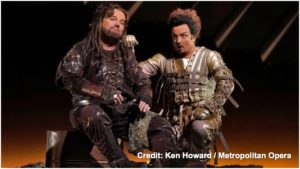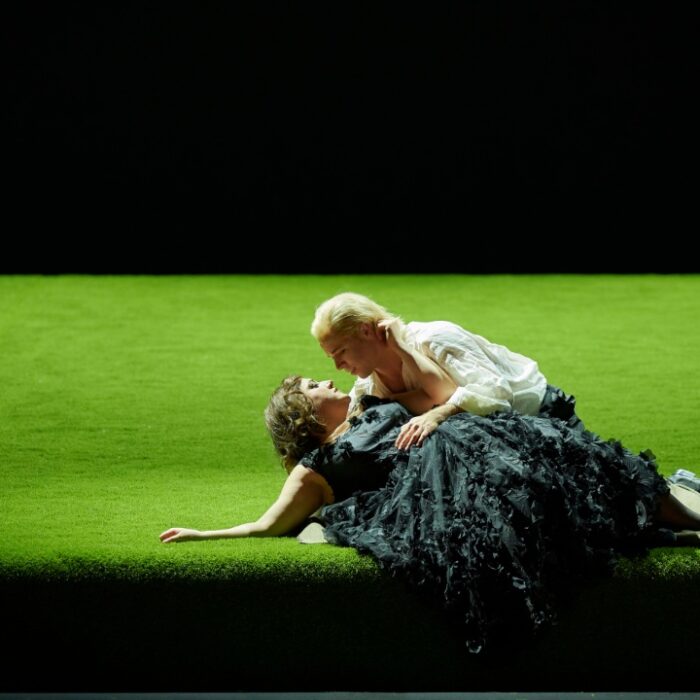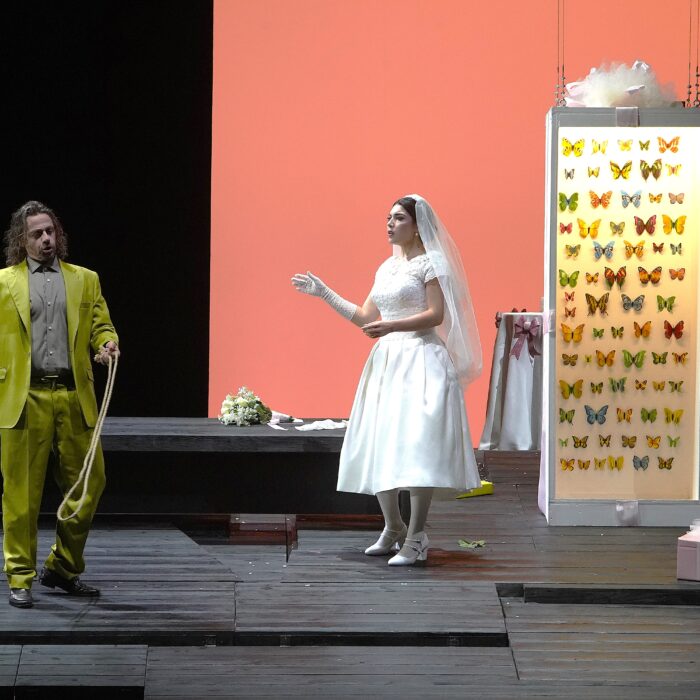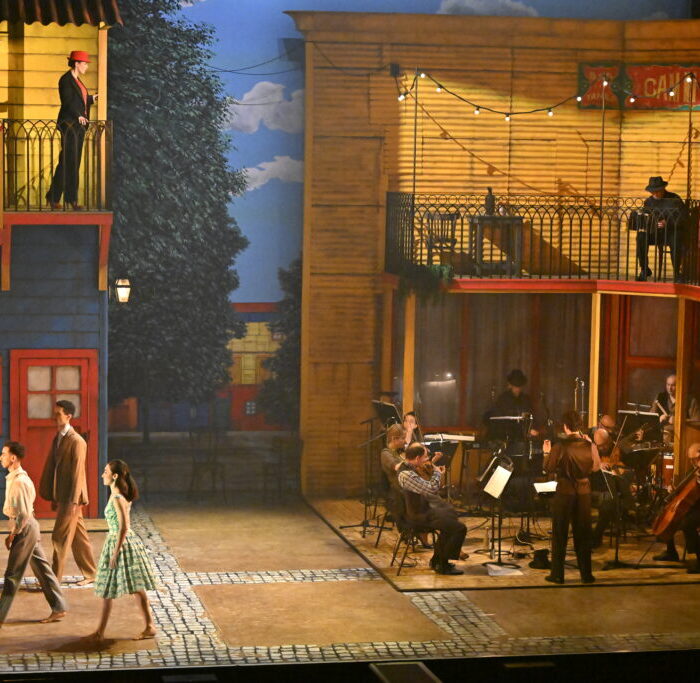
Metropolitan Opera 2018-19 Review: Das Rheingold
Tomasz Konieczny, Norbert Ernst Have Unforgettable Debuts
By David SalazarWagner’s “Der Ring Des Nibelungen” made its long-awaited comeback to the Met Opera on Saturday afternoon with a performance of “Das Rheingold.”
The Wagner epic is always a major draw for audiences and the house was packed for the matinee performance which marked the return of the famed “machine” production by Robert LePage as well as a number of debuts in the cast. In fact, it is safe to say that the debutants were the ultimate scene stealers of the performance.
Dominant Debutants
Any comment on this performance much start with Tomasz Konieczny, who has been making waves in Europe for years. While he has done Wotan, he was cast here as the “villainous” Alberich. The truth is that Konieczny conjured up one of the greatest Met performances of the season, creating a rich portrayal of a tragic figure who is scorned and rejected by those who feel themselves superior to him. When he loses it all, he turns down a darker path.
Alberich, of course, wants to take over the world, making him the ultimate supervillain, but in Konieczny’s hands, he becomes not only a richer type of villain who we can identify with, but also deeply sympathize with as well. In fact, that is what made the production all the more unforgettable. As he uttered his “Wie durch Fluch er mir gerieth, verflucht sei dieser Ring!” each line had an increased desperation that was supported by increased jaggedness in his vocal delivery. We felt for him and could even get on board with that anger and venom he was spewing at the much cooler Wotan, as portrayed by Greer Grimsley. He felt like a threat for sure and you wondered how he might attack Wotan once freed from his chains, but you also saw him as wounded and hurt.
But this aggressive portrayal in Alberich’s final moments was the result of a potent arc. In his initial scenes, he was playful and awkward, the gruffness of his singing a complete contrast to the more refined legato lines from the rhinemaidens. When they repeatedly reject him, he remains of a kind disposition, ultimately turning when he sees the shimmering gold in the river. It is here that you could see him slowly slip toward the forbidden object, growing increasingly invested with every passing moment. You couldn’t keep your eyes away from this transformation in all of Konieczny’s being.
When we see him a few scenes later as the all-powerful ruler of the Niebelungen, Konieczny was unbridled passion and intensity, his voice soaring into the rafters of the Met with general ease. He was omnipotent in every way possible, making him a truly imposing threat to Wotan and Loge as they tried to defeat him.
When he was finally captured and at Wotan’s mercy, there was a growing volatility in his behavior, supported by a booming sound that just seemed to shift into another gear. He was fighting for his survival and you could feel it at every step of the way.
The Polish bass-baritone drew the most applause at the curtain, the audience showering him with intense love. He fully deserved it for what was undeniably a towering showcase.
Then there was Norbert Ernst, who shone brightly (pun intended) as the fire demi-god Loge in his Met debut. His shimmering tenor perfectly suited the character’s vibrant disposition. His way with the text emphasized the sarcastic nature of Loge, particularly as he toyed with Alberich and Mime in the mines of Niebelheim. Perhaps what made his performance all the more potent was his physicality.
Besides walking backwards up and down a central plank in the second and last scene, he twirled around as he fooled with the Niebelungs and even made fun of the giants. But Loge’s character is more than just a joke machine and Ernst imbued him with a palpable arc. As Wotan’s lust after the ring grew, you could see Ernst transform from an unflappable and mischievous personage to someone growing increasingly disenchanted and cautious. By the end of the opera, it is the image of Loge, locked out of Valhalla, looking on at the Gods’ new castle. He is not a part of it, but it has been clear that he doesn’t want to be, either.
Wotan & Fricka
As Wotan, Greer Grimsley was a rugged Wotan. Physically, he was imposing and sturdy and he had an aloofness that made him a bit icy, never once revealing any sense of weakness. However, his voice was not quite on that level of potency. His lows and middles were often covered by the thick orchestral playing and his higher notes were rocky, the open vowels sounding pushed. On longer high notes, the vibrato seemed a bit shaky and the pitch slightly off. When he had to prepare for a higher note, the phrasing tended toward choppiness in line, which tended to undercut any sense of poise he might have given Wotan. This was especially present during the early scenes of the opera. Grimsley seemed to warm up as the performance developed, though these aspects of his singing remained present intermittently throughout.
Still there were some strong moments from the bass-baritone throughout the afternoon, particularly in his confrontation scene with Alberich when he demands the ring. Here he expressed Wotan’s violent energy through “Her der Ring!“ as he reached the apex of his confrontation with his great rival. His obsession with the ring was also quite fascinating to behold, the bass-baritone holding our attention with incessant glances at his new piece of powerful jewelry.
Jamie Barton was a potent presence as Fricka, emphasizing the goddess as a woman doing all she can to save her sister from an unwanted fate. From the off, it was clear that she had been pushed to the sidelines by her husband and she no longer wanted any of that. She was hurting and wasn’t willing to lose her beloved sister because of this insensitive man.
While she displayed considerable vulnerability (her delicate and expansive singing on “verspielst du in lästerndem Spott Liebe und Weibes Werth?” was heartbreaking and really honed in on the core pain in Fricka’s life), she was also assertive in confronting Wotan.
She was a force that had no fear of backing down from him. Even when he laughed off her reproaches, she remained steadfast, never giving in and working to make him understand his fault. Through her character, we were able to understand Wotan’s greatest failing – his inability to see his own missteps.
Unrequited Love
The two giants were perfectly cast with Günther Groissböck as Fasolt and Dmitry Belosselskiy as Fafner. They played well together as equals but also in direct contrast to one another. While Groissböck’s Fasolt was clearly the more elegant and gentle of the two, Belosselskiy’s Fafner was more of a brute. This was borne out in their respective vocal lines with Groissböck utilizing a more delicate vocal style that had a more blended vibrato. Anyone that has heard Belosselskiy sing Verdi knows that he is also capable of a glorious and elegant legato line, but here he had a more accented and harsher quality in his singing.
Moreover, their respective physicality made the contrast stronger. Fasolt had more firm posture while Fafner was more curvy in his stance. If this production does anything well, it’s to establish Fasolt’s love for Freia as sincere and Groissböck heightened that interpretation with the most gentle of singing and glances when looking or referring to Freia. In a brief exchange in which Fafner tells his brother that the gold is worth more than the goddess, he does so as Fasolt looks on at what will be his lost love. These contrasting behaviors give the relationship between these characters a great deal of vitality, something often missing in previous renditions of this production.
Wendy Bryn Harmer has a massive instrument that she put to tremendous use, particularly in her very first lines “Hilf mir, Schwester! schütze mich, Schwäher!” where her impassioned delivery broke through a far more relaxed atmosphere from the prior scene between Wotan and Fricka. Harmer is a veteran of this production, having appeared as Freia in previous presentations of the cycle and what has always been a highlight is her characterization of the goddess. From her perspective, the relationship with Fasolt actually feels like that of a love-hate dynamic and with Groissböck’s lovable Fasolt, the tension was amped up when the two shared brief glances at one another. It complicates the drama as a whole, adding another layer of complexity to the inner lives of these characters.
Rheinmadens, Gods & A Dwarf
The three Rhinemaidens were performed by Amanda Woodbury, Tamara Mumford, and Samantha Hankey were everything you’d want from the trio. They were having a blast during that opening scene, even if limited by the wardrobe and technology. Their singing had purity that combined beautifully throughout their ensembles.
Gerhard Siegel gave a tremendously physical portrayal of Mime. He was comedy gold in his brief scene with an “invisible Alberich.” The tenor played up the beat for all it was worth and simply had the audience laughing all the way through.
Karen Cargill’s Erda had a coarse quality but the cool delivery of her lines added a sense of dread and tension to Wotan’s big dramatic decision.
As Donner and Froh, Michael Todd Simpson and Adam Diegel were solid, though they seemed a bit unsure in their respective passages near the end of the opera. Simpson’s voice sounded unsteady during his big “Schwüles Gedünst schwebt in der Luft,” the slower tempo affected his phrasing, the voice sounding pushed. Meanwhile Diegel also seemed a bit apprenhensive during “Zur Burg führt die Brücke.” That likely comes down to what happened in the pit.
In the Pit
Speaking of the pit, maestro Philippe Jordan put in a frustrating performance overal that was defined by strong setup with often lacking payoff. The prelude got off to an absorbing start with the phrasing expansive and the layers building on top of one another methodically, but fluidly. You felt the tension build. The power of this movement is its sense of drive and the anticipation of climax that it surely builds for the listener. And Jordan established all of those ingredients early on. But the build seemed to stop after a certain moment. In fact, as more elements were added to the orchestral mix, the effect came off as sloppy, the orchestra not seemingly coalescing and ultimately undercutting the arpeggio explosion that leads into the first “Weia!” of the Rhinemaidens. The brass section also seemed to struggle at several junctures, including the opening and close of the opera.
Donner’s big “Schwüles Gedünst schwebt in der Luft” sounded disorganized from the outset, the conductor and his soloist on different wavelengths, the tempo unsteady, and the effect rendered null both onstage and in the pit. The violins, with their incessant fast passages here, sounded off. The harp also seemed to be on a different pace from the maestro in Froh’s ensuing “Zur Burg führt die Brücke,” the arpeggiations not on the same beat with the rest of the orchestra. The cumulative effect simply made the ending feel like it might come apart. Jordan’s subsequent cautious approach to the final bars thus came off as a bit anti-climactic in the midst of it all.
It was quite surprising given that the remainder of the night was defined by steadiness, the orchestra very much tailored toward the needs of singers. Some of the passages stood out for their poise, particularly the Niebelheim theme.
The Elephant in the Room
And now let’s address the elephant in the room – Robert LePage’s controversial “Machine” which has a propensity for ill-timed malfunctions. In my history of watching this production, I have had not shortages of “incidents” with the Met’s gargantuan piece of technology. I remember the first night of the production and the rainbowless ending in “Das Rheingold.” I will never forget Deborah Voigt sliding off and falling as the first performance of “Die Walküre” got underway and the subsequent fear all the performers had of getting on it. There was a performance of “Siegfried” in which the production got stuck on the fire projection prior to the final scene, forcing Brünnhilde to walk onstage and lay down before having the love duet play out amidst a wall of fire. Then there was that time that the Windows XP flashed in the middle of a presentation of “Das Rheingold,” interrupting the flow of the show.
And then there’s the noise that the big structure creates, often to the hindrance of the music.
Presumably there were many fixes done on this occasion for what is rumored to be the final revival of the behemoth production, though on Saturday things didn’t get off to the best of starts.
The creaking appeared almost immediately as the planks rotated during the famed prelude, competing with the music and distracting from its effect. For some reason, they stopped halfway during their rotation and just stood there. One hopes that it was a technical mishap because it created a strange tension in the middle of one of the opera’s most glorious musical passages. If the tension was the product of a technical mishap, then that is, at least, understandable. But if it is a deliberate artistic choice, then it is a poorly timed one.
The reason I even ponder this is because for all its improvements (the creaking, fortunately wasn’t a major participant of this performance, save for a few other moments), the production remains a study in contradictions and questionable priorities. The Met’s general manager Peter Gelb spent a lot of time during the production’s early days talking about how expensive it was, the figures going as high as over $15 million.
The technology is “cool.” The planks rotate and we see some interesting images, once in a while. The rhinemaidens swivel around and the projected rocks move accordingly. Or the Gods move in front of a sea of clouds and the clouds change accordingly to interact with the movement.
In theory this should be impactful, but it has no true bearing on the dramatic proceedings and can’t make up for the fact that despite being positioned as a main character in this drama, it is more of a backdrop to other elements that don’t quite work; as such, the machine itself is more of a gimmick.
Those elements are the visual ones that we actually interact with for most of the evening – the props and costumes, all of which are rather unflattering and frankly silly and cartoonish. The male gods all sport breast-plates that don’t say anything about who anyone is and look like they were the default cliché for how to dress the gods. Alberich’s get-up is a combination of dark colors. The women are all over the place with Erda wearing something that looks more akin to a black concert dress.
The props don’t fare much better, especially the “toad” and the massive bony snake. When Wotan and Loge laughed at how pathetic Alberich’s power boasting was, you couldn’t help but feel that you were laughing with them at how silly the snake was. Who knows if the intention was to truly make the audience feel that Alberich’s convulsing literal bone-headed snake was a joke. Why would Alberich, in his attempt to show off his power and instill fear in his enemy, have his new form shake its head incessantly? Why not something more poised and in control? It’s these kinds of details that bring this production down and emphasize that the priorities were on computer graphics instead of directing drama. It’s the equivalent of so many Hollywood tentpole films filled with mesmerizing but ultimately empty visual effects that hide the fact that the director was less engaged with engaging with characters or story.
Speaking of the staging, revival director J. Knighten Smit made some changes that brough some life to the overall feel of the opera. There are a few moments where the actors seem more comfortable with what is going on, though the same sloppy blocking remains, most of it due to limitations imposed by the machine.
Every time that Freia needs to be captured by a giant, you could see Harmer get close to the planks, watch a plank descend slightly and then see her put her arm on it so that either Fafner or Fasolt could grab her and pull her up. The reason this was even noticeable amidst the drama was that the first such instance of it made no sense from a character perspective. Why would Freia, knowing that the giants want to take her away, even get close to one of them? And if she’s going to walk toward them, why would it ever be Fafner instead of Fasolt? When this initially took place, the dissonance of the movement and motivation put all my attention on that action and I watched it play out clumsily. When it happened the second time, it was even more obvious. This never happens if the giants are not placed on planks to emphasize them as “taller” than the other characters, thus limiting their movement and forcing any interaction with them to also require help from the planks.
Anything requiring one character to stab another doesn’t really register as overly veritable (though the lighting at the end of Fasolt’s murder, while overly literal, is effective).
This isn’t to say that some stuff doesn’t work. The opening scene with the Rhinemaidens is solidly staged, even if the slipping and sliding gets a bit redundant as a joke; at some point you start to wonder if maybe the Rhinemaiders could use their differing personalities to impose different physical hijinks on Alberich that don’t require throwing him down the slide.
But in general, the best staging came from individual touches by performers. Ernst and Siegel were the biggest beneficiaries here, particularly during the sequence in which Mime is “beat up” by an invisible Alberich.
All in all, it’s the Ring. And that alone makes it one of the most watchable production at the Met right now. Tomasz Konieczny is the big draw in this case, but all the other performers are strong in their own rights and should further develop with more productions.


